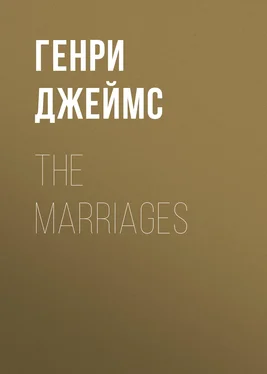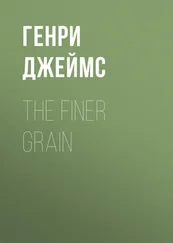Генри Джеймс - The Marriages
Здесь есть возможность читать онлайн «Генри Джеймс - The Marriages» — ознакомительный отрывок электронной книги совершенно бесплатно, а после прочтения отрывка купить полную версию. В некоторых случаях можно слушать аудио, скачать через торрент в формате fb2 и присутствует краткое содержание. Жанр: foreign_prose, foreign_antique, на английском языке. Описание произведения, (предисловие) а так же отзывы посетителей доступны на портале библиотеки ЛибКат.
- Название:The Marriages
- Автор:
- Жанр:
- Год:неизвестен
- ISBN:нет данных
- Рейтинг книги:4 / 5. Голосов: 1
-
Избранное:Добавить в избранное
- Отзывы:
-
Ваша оценка:
- 80
- 1
- 2
- 3
- 4
- 5
The Marriages: краткое содержание, описание и аннотация
Предлагаем к чтению аннотацию, описание, краткое содержание или предисловие (зависит от того, что написал сам автор книги «The Marriages»). Если вы не нашли необходимую информацию о книге — напишите в комментариях, мы постараемся отыскать её.
The Marriages — читать онлайн ознакомительный отрывок
Ниже представлен текст книги, разбитый по страницам. Система сохранения места последней прочитанной страницы, позволяет с удобством читать онлайн бесплатно книгу «The Marriages», без необходимости каждый раз заново искать на чём Вы остановились. Поставьте закладку, и сможете в любой момент перейти на страницу, на которой закончили чтение.
Интервал:
Закладка:
Henry James
The Marriages
I
“Won’t you stay a little longer?” the hostess asked while she held the girl’s hand and smiled. “It’s too early for every one to go—it’s too absurd.” Mrs. Churchley inclined her head to one side and looked gracious; she flourished about her face, in a vaguely protecting sheltering way, an enormous fan of red feathers. Everything in her composition, for Adela Chart, was enormous. She had big eyes, big teeth, big shoulders, big hands, big rings and bracelets, big jewels of every sort and many of them. The train of her crimson dress was longer than any other; her house was huge; her drawing-room, especially now that the company had left it, looked vast, and it offered to the girl’s eyes a collection of the largest sofas and chairs, pictures, mirrors, clocks, that she had ever beheld. Was Mrs. Churchley’s fortune also large, to account for so many immensities? Of this Adela could know nothing, but it struck her, while she smiled sweetly back at their entertainer, that she had better try to find out. Mrs. Churchley had at least a high-hung carriage drawn by the tallest horses, and in the Row she was to be seen perched on a mighty hunter. She was high and extensive herself, though not exactly fat; her bones were big, her limbs were long, and her loud hurrying voice resembled the bell of a steamboat. While she spoke to his daughter she had the air of hiding from Colonel Chart, a little shyly, behind the wide ostrich fan. But Colonel Chart was not a man to be either ignored or eluded.
“Of course every one’s going on to something else,” he said. “I believe there are a lot of things to-night.”
“And where are you going?” Mrs. Churchley asked, dropping her fan and turning her bright hard eyes on the Colonel.
“Oh I don’t do that sort of thing!”—he used a tone of familiar resentment that fell with a certain effect on his daughter’s ear. She saw in it that he thought Mrs. Churchley might have done him a little more justice. But what made the honest soul suppose her a person to look to for a perception of fine shades? Indeed the shade was one it might have been a little difficult to seize—the difference between “going on” and coming to a dinner of twenty people. The pair were in mourning; the second year had maintained it for Adela, but the Colonel hadn’t objected to dining with Mrs. Churchley, any more than he had objected at Easter to going down to the Millwards’, where he had met her and where the girl had her reasons for believing him to have known he should meet her. Adela wasn’t clear about the occasion of their original meeting, to which a certain mystery attached. In Mrs. Churchley’s exclamation now there was the fullest concurrence in Colonel Chart’s idea; she didn’t say “Ah yes, dear friend, I understand!” but this was the note of sympathy she plainly wished to sound. It immediately made Adela say to her “Surely you must be going on somewhere yourself.”
“Yes, you must have a lot of places,” the Colonel concurred, while his view of her shining raiment had an invidious directness. Adela could read the tacit implication: “You’re not in sorrow, in desolation.”
Mrs. Churchley turned away from her at this and just waited before answering. The red fan was up again, and this time it sheltered her from Adela. “I’ll give everything up—for you ,” were the words that issued from behind it. “ Do stay a little. I always think this is such a nice hour. One can really talk,” Mrs. Churchley went on. The Colonel laughed; he said it wasn’t fair. But their hostess pressed his daughter. “Do sit down; it’s the only time to have any talk.” The girl saw her father sit down, but she wandered away, turning her back and pretending to look at a picture. She was so far from agreeing with Mrs. Churchley that it was an hour she particularly disliked. She was conscious of the queerness, the shyness, in London, of the gregarious flight of guests after a dinner, the general sauve qui peut and panic fear of being left with the host and hostess. But personally she always felt the contagion, always conformed to the rush. Besides, she knew herself turn red now, flushed with a conviction that had come over her and that she wished not to show.
Her father sat down on one of the big sofas with Mrs. Churchley; fortunately he was also a person with a presence that could hold its own. Adela didn’t care to sit and watch them while they made love, as she crudely imaged it, and she cared still less to join in their strange commerce. She wandered further away, went into another of the bright “handsome,” rather nude rooms—they were like women dressed for a ball—where the displaced chairs, at awkward angles to each other, seemed to retain the attitudes of bored talkers. Her heart beat as she had seldom known it, but she continued to make a pretence of looking at the pictures on the walls and the ornaments on the tables, while she hoped that, as she preferred it, it would be also the course her father would like best. She hoped “awfully,” as she would have said, that he wouldn’t think her rude. She was a person of courage, and he was a kind, an intensely good-natured man; nevertheless she went in some fear of him. At home it had always been a religion with them to be nice to the people he liked. How, in the old days, her mother, her incomparable mother, so clever, so unerring, so perfect, how in the precious days her mother had practised that art! Oh her mother, her irrecoverable mother! One of the pictures she was looking at swam before her eyes. Mrs. Churchley, in the natural course, would have begun immediately to climb staircases. Adela could see the high bony shoulders and the long crimson tail and the universal coruscating nod wriggle their horribly practical way through the rest of the night. Therefore she must have had her reasons for detaining them. There were mothers who thought every one wanted to marry their eldest son, and the girl sought to be clear as to whether she herself belonged to the class of daughters who thought every one wanted to marry their father. Her companions left her alone; and though she didn’t want to be near them it angered her that Mrs. Churchley didn’t call her. That proved she was conscious of the situation. She would have called her, only Colonel Chart had perhaps dreadfully murmured “Don’t, love, don’t.” This proved he also was conscious. The time was really not long—ten minutes at the most elapsed—when he cried out gaily, pleasantly, as if with a small jocular reproach, “I say, Adela, we must release this dear lady!” He spoke of course as if it had been Adela’s fault that they lingered. When they took leave she gave Mrs. Churchley, without intention and without defiance, but from the simple sincerity of her pain, a longer look into the eyes than she had ever given her before. Mrs. Churchley’s onyx pupils reflected the question as distant dark windows reflect the sunset; they seemed to say: “Yes, I am , if that’s what you want to know!”
What made the case worse, what made the girl more sure, was the silence preserved by her companion in the brougham on their way home. They rolled along in the June darkness from Prince’s Gate to Seymour Street, each looking out of a window in conscious prudence; watching but not seeing the hurry of the London night, the flash of lamps, the quick roll on the wood of hansoms and other broughams. Adela had expected her father would say something about Mrs. Churchley; but when he said nothing it affected her, very oddly, still more as if he had spoken. In Seymour Street he asked the footman if Mr. Godfrey had come in, to which the servant replied that he had come in early and gone straight to his room. Adela had gathered as much, without saying so, from a lighted window on the second floor; but she contributed no remark to the question. At the foot of the stairs her father halted as if he had something on his mind; but what it amounted to seemed only the dry “Good-night” with which he presently ascended. It was the first time since her mother’s death that he had bidden her good-night without kissing her. They were a kissing family, and after that dire event the habit had taken a fresh spring. She had left behind her such a general passion of regret that in kissing each other they felt themselves a little to be kissing her. Now, as, standing in the hall, with the stiff watching footman—she could have said to him angrily “Go away!”—planted near her, she looked with unspeakable pain at her father’s back while he mounted, the effect was of his having withheld from another and a still more slighted cheek the touch of his lips.
Читать дальшеИнтервал:
Закладка:
Похожие книги на «The Marriages»
Представляем Вашему вниманию похожие книги на «The Marriages» списком для выбора. Мы отобрали схожую по названию и смыслу литературу в надежде предоставить читателям больше вариантов отыскать новые, интересные, ещё непрочитанные произведения.
Обсуждение, отзывы о книге «The Marriages» и просто собственные мнения читателей. Оставьте ваши комментарии, напишите, что Вы думаете о произведении, его смысле или главных героях. Укажите что конкретно понравилось, а что нет, и почему Вы так считаете.












